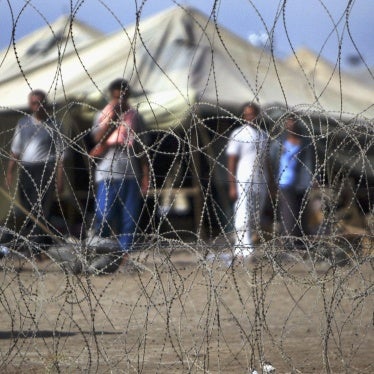It has now been one year since the appearance of the first pictures of U.S. soldiers humiliating and torturing detainees at Abu Ghraib prison in Iraq. When the pictures first stunned the world, Washington sought to portray them as an isolated incident, the work of a few "bad apples." President Bush spoke of "disgraceful conduct by a few American troops who dishonored our country and disregarded our values."
We now know, however, that the only truly exceptional aspect of the horrors at Abu Ghraib was that they were photographed.
Abu Ghraib was, in fact, only the tip of the iceberg.
Around the world, in a long archipelago of recognized and secret detention centers, the United States is brutalizing Muslim detainees in the name of the war on terror.
The United States must investigate the role of top officials, such as Defense Secretary Donald H. Rumsfeld and former CIA Director George J. Tenet, in this scandal that has done so much to harm the reputation and interests of the country. If Attorney General Alberto R. Gonzales, who is involved in these policies, will not begin such a probe, a special prosecutor should be appointed.
At Guantanamo Bay, Cuba, reports have recently emerged about FBI agents who witnessed chained detainees forced to sit in their own excrement, adding to accounts of painful stress positions, female interrogators humiliating detainees and prolonged exposure to extremes of heat and cold.
In Afghanistan, where at least nine prisoners have died in U.S. custody, detainees have been beaten severely by guards and interrogators, deprived of sleep for extended periods and intentionally exposed to extreme cold.
At least 11 al-Qaida suspects, and most likely many more, have simply "disappeared." The CIA is holding them in undisclosed locations, with no notification to their families, no access to the International Committee of the Red Cross and no oversight of their treatment, effectively placing them beyond the protection of the law. One detainee, Khalid Shaikh Mohammed, an alleged architect of 9/11, was reportedly "waterboarded" - strapped down, forcibly pushed under water and made to believe he might drown.
About 100 to 150 detainees have been "rendered" to countries where torture is routine. For example, Maher Arar, a Canadian in airplane transit in New York, was detained and sent to Syria. On his release 10 months later, he described repeated torture, often with cables and electrical cords.
This pattern of abuse across several countries did not result from the acts of individual soldiers who broke the rules. It resulted from decisions made by senior U.S. officials to bend, ignore or cast rules aside. Yet only the soldiers at the bottom of the chain, such as Pfc. Lynndie R. England and Spc.
Charles A. Graner Jr. who were photographed at Abu Ghraib, are taking the heat while the policy-makers are going free.
Just last week, the Army cleared Lt. Gen. Ricardo Sanchez, the former senior U.S. commander in Iraq, of any wrongdoing. Yet General Sanchez gave the interrogators at Abu Ghraib the authority to use dogs to terrorize detainees, and they did, and we know what happened.
And there is still a lot we do not know. Directives reportedly signed by President Bush authorizing the CIA to establish secret detention facilities and to "render" suspects to countries where torture is used remain classified. Many more photos and videos of detainee abuse remain secret.
Although these policies were adopted in the name of the war on terror, the United States' widespread mistreatment of Muslim prisoners has certainly been a boon for al-Qaida.
The U.S. actions also pose a direct challenge to human rights enforcement worldwide. Perpetrators of atrocities from Sudan to Zimbabwe have been all to happy to point to the U.S. treatment of prisoners to deflect criticism of their conduct.
Most disturbing, however, may be the idea that the United States has become a nation that finds torture acceptable. And despite all the damage done, Attorney General Gonzales still insisted in January that the CIA was not barred from using cruel, inhuman or degrading treatment when it interrogates non-Americans outside the United States.
If the United States is to wipe away the stain of Abu Ghraib, it needs to prosecute those at the top who ordered or condoned torture, come clean on what the president has authorized, and repudiate, once and for all, the mistreatment of detainees.
Reed Brody is special counsel with Human Rights Watch and author of its report "The Road to Abu Ghraib."








